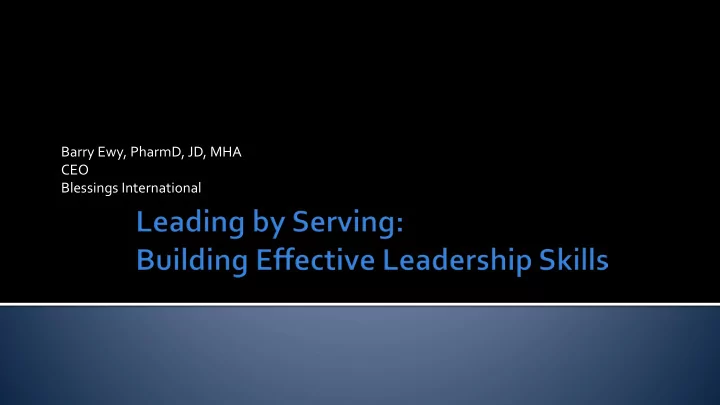

Barry Ewy, PharmD, JD, MHA CEO Blessings International
I have the following financial relationships to disclose: I am an Employee of Blessings International. I will not discuss off label use and/or investigational use in my presentation.
At the conclusion of this activity, participants should be able to: Describe what leadership is; Describe what Servant Leadership is; Discuss how Love and Servant Leadership are connected; and Discuss conflict and how to appropriately respond.
The power or ability to lead other people. Merriam-Webster, 2016. Power Ability Lead People
Influence comes from: Character Knowledge Experience Past Success Ability Abraham Lincoln – Black Hawk War Trust Built by: Competence, Connection, and Character The onus is not on them to trust, it’s on you to earn it
Natural Ability When leaders recognize leadership in others, they tend to follow the strongest leader. Developing Ability Adaptability / Flexibility Accepting Uncertainty Relationship Skills Setting Priorities
Opinion Research Council Leading by Example 26% Strong Ethics 19% Business Knowledge 17% Fairness 14% Intelligence and Competence 13% Sharing Recognition 10%
Empathy Managing Information 25-25-50 Rule Motivation The intensity of a person’s desire to engage in an activity. Problem Solving Anticipate problems Accept the truth Handle one problem at a time Team Building
Adding To or Subtracting From Others Empowering Others Barriers ▪ Desire for Job Security ▪ Resistance to Change ▪ Lack of Self-Worth Surround Yourself with a Team
Who is the greatest leader ever? What were their traits? Jesus Christ Jesus called them together and said, “You know that those who are regarded as rulers of the Gentiles lord it over them, and their high officials exercise authority over them. Not so with you. Instead, whoever wants to become great among you must be your servant, and whoever wants to be first must be slave to all. For even the Son of Man did not come to be served, but to serve, and to give his life as a ransom for many.” Mark 10: 42-45
The business of identifying and meeting the legitimate needs of people entrusted to your care. Identify Legitimate needs People Entrusted
Leadership Authority Service and Sacrifice Love Will
Vince Lombardi 1 Corinthians 13:4-8 Love is a Verb Patience Kindness Humility Respectfulness Selflessness Forgiveness Honesty Commitment Mark 12:31 “Love your neighbor as yourself”
Influence is like a garden Relational checking account Publicly praise / privately punish By the numbers 4:1 85% 100% 25% 60%
We only HAVE to die and … We all have to make choices about our behavior and accept the responsibility of the outcomes. Choices may be unnatural until it becomes habit. Stages of developing a new habit: Stage 1: Unconcisous and Unskilled Stage 2: Conscious and Unskilled Stage 3: Conscious and Skilled Stage 4: Unconscious and Skilled
Predetermine a course of action Lay out your goals Adjust your priorities Notify key personnel Allow time for acceptance Head into action Expect problems Always point to the successes Daily review your plan
All great relationships, the ones that last over time, require productive conflict in order to grow. This is true in marriage, parenthood, friendship, and certainly business. Important to distinguish productive ideological conflict from destructive fighting and interpersonal politics.
FOCUS • on the achievements of collective results • one another accountable for delivering HOLD against those plans COMMIT to decisions and plans of action ENGAGE in unfiltered conflict around ideas TRUST one another
FOCUS HOLD COMMIT ENGAGE TRUST The confidence among team members that their peers’ intentions are good, and that there is no reason to be protective or careful around the group. Teammates must be comfortable being vulnerable with one another. These include: Weaknesses, skill deficiencies, interpersonal shortcomings, mistakes and requests for help Teams that lack trust: Conceal their weaknesses and mistakes from one another Are reluctant to take risks in asking for or offering assistance Jump to conclusions about the intentions and aptitudes of others without attempting to clarify them
FOCUS HOLD COMMIT ENGAGE TRUST Teams that avoid ideological conflict often do so to avoid hurting team members’ feelings, and then end up encouraging dangerous tension. When team members do not openly debate and disagree about important ideas, they often turn to back-channel personal attacks, which are far nastier and more harmful than any heated argument over issues. The Five Dysfunctions of a Team
FOCUS • on the achievements of collective results • one another accountable for delivering HOLD against those plans COMMIT to decisions and plans of action ENGAGE in unfiltered conflict around ideas TRUST one another
If you make a mistake, fess up Deal with small problems before they become big Don’t let one person derail the team Make a decision and implement it (then change course if needed).
Perhaps (leadership) is not so magical after all. Leadership is simply the hard work of learning how to influence others and accomplish collaboratively what no one could have done on their own. It means taking the time to think before acting. Once you’ve acted, it means taking time to reflect long enough to know what just happened, why it happened, how it happened, and how to replicate the narrow path to success and avoid the broad path to failure. Dick Daniels – Leadership Briefs
21 Irrefutable Laws of Leadership by John Maxwell The Five Dysfunctions of a Team by Patrick Lencioni 7 Habits of Highly Effective People by Stephen Covey
Recommend
More recommend